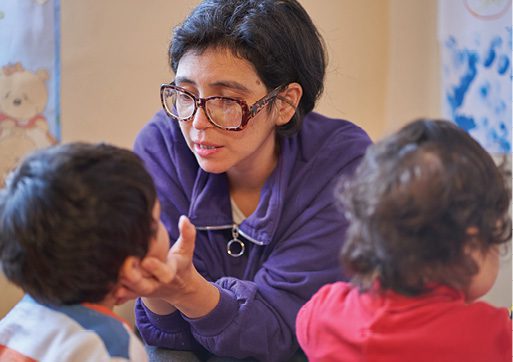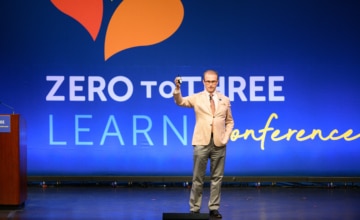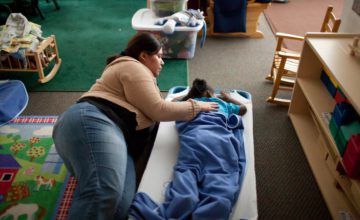Erika Gustafson Dietz, Erikson Institute, and Johnna Darragh Ernst, Heartland Community College

Abstract
This article highlights two competency-based coaching and mentoring models for the incumbent infant–toddler workforce, designed and implemented at two Illinois institutions of higher education. Each model has been intentionally developed with an anti-bias and equity lens, focused on cultivating a diverse workforce of practitioners through practice based supports and external partnerships. The long-term goals of both models are to nurture the development of participants’ ability and self-efficacy in the areas of essential infant–toddler competencies, foundational components of relationship-based care, and leadership, thereby benefiting the infant–toddler incumbent workforce and increasing access to high-quality care for children and families.
The enormous importance of the first 3 years of a young child’s life has been well established through extensive research. High-quality early learning and development programs are key in ensuring that young children have experiences needed to develop and thrive. Infant–toddler practitioners are the backbone of quality early learning programs, and the preparation and education they receive is of paramount importance.
The Need for Workforce Development
The infant–toddler field is facing a crisis in both pathways and pipelines. There is an anticipated shortage in excess of 10% in the number of qualified early childhood professionals in the next 10 years (Kwon et al., 2020). This expected shortage was only exacerbated by the COVID-19 pandemic, which created new issues, and magnified existing ones, within the field for leaders, practitioners, families, and children. Practitioners were tasked with delivering high-quality, play-based, engaging experiences and supporting families (often virtually), while taking on a variety of new COVID-related responsibilities. Not surprisingly, practitioners reported feeling “sad, restless, worthless, nervous, hopeless, and overall decreased levels of well-being” (Swignoskil et al., 2021). Teacher preparation programs were also impacted, as the field placements, practicums, and other formative experiences that provide practical experience were put on pause and replaced with virtual learning opportunities. Teachers entered the workforce feeling inadequately prepared for the realities of their work (Callaway-Cole & Kimble, 2021). However, when structures and supports were in place to nurture practitioner well-being, some negative professional impacts of the pandemic were mitigated (Eadie et al., 2021).
The need for effective educational pathways and strategies that are responsive to the unique needs of the infant–toddler workforce—such the implementation of evidence-based coaching and mentoring strategies—is a unique and pressing challenge. The incumbent workforce of infant–toddler teachers currently caring for young children faces challenges in advancing their credentials and degrees. The field also faces a need to expand the pipeline of infant–toddler professionals. Competency-based education provides an important tool supporting both incumbent and incoming professionals.
Competency-Based Education
Competency-based education (CBE) is an approach that has received renewed attention because of its capacity to be responsive to individual learner needs. When implemented well, CBE respects what learners know and are able to do, and it can be used to construct individualized learner pathways that support the infant–toddler workforce in attaining essential competence leading to credentials and degrees. CBE requires partnerships between key stakeholders in that field. In the infant–toddler field, these stakeholders represent the whole of professional development, including training and higher education programs, employers, and practitioners. Well-designed, competency-based models are transparent, meaning
- learners understand what is expected of them;
- trainers and faculty have clarity regarding role expectations and how to support the development of related competencies;
- and employers have assurances that learners have the knowledge, skills, and intellectual behaviors that will ensure success within targeted roles (Latham, et al., in press).
For infant–toddler practitioners, the need to develop and thrive is mirrored not only in educational preparation, but in their chosen field-based role.
The Illinois Competency-Based Assessment System
Illinois developed a competency-based assessment system (CBAS) to create a seamless, continuous system across the whole of professional development impacting infant–toddler practitioners. The Illinois CBAS emerged in the context of higher education and included competency-based performance indicators embedded across the state professional development system. These indicators were anchored on a behaviorally defined set of competency areas and were created using the backward design process, resulting in a career pathway model that was linked to industry-recognized Gateways to Opportunity® Credentials, which are arranged within a career lattice. The Gateways to Opportunity Credentials have portability, through both a statewide registry system and the Illinois transfer articulation system, which supports ongoing development as well as employer validation of earned credentials within a credit-bearing framework. The CBAS provides transparency in both professional and educational growth by articulating and supporting clear career and professional development pathways.
Similar to many states, Illinois requires minimal qualifications for the infant–toddler workforce. Relatively few incumbent infant–toddler workers have 2- or 4-year degrees (see Table 1).
The Gateways to Opportunity Infant Toddler Credential (ITC) is offered in Illinois at 33 2-year institutions and 10 4-year institutions of higher education. This credential builds on the knowledge and skills individuals earn in the Gateways to Opportunity ECE Credential, representing one of several areas of specialization that learners can pursue. The Gateways Credentials are awarded by the Illinois Department of Human Services Bureau of Child Care and Development, administered through the Illinois Network of Child Care Resource and Referral Agencies, and are in legislative rule.
Competencies within the Gateways ITC are arranged in seven content areas and leveled to align directly to roles in the field. For example, competencies in Level 2, representing the foundational competencies, are aligned with role expectations for individuals who will fulfill entry-level positions in the field, such as an assistant teacher. Competencies in Level 6, representing the other end of the competency continuum, are aligned with role expectations for individuals who will serve as coaches, mentors, and/or supervisors. The competencies are scaffolded, requiring mastery of foundational competencies prior to attainment of higher-level competencies. There are 54 total competencies across Levels 2–6, and these are offered at the associate’s through master’s degree.
CBE and Diversity-Informed Tenets
The Competency-Based Education Network’s Quality Framework is a comprehensive set of principles and standards that serves as reference for programs working to design and implement CBE programs. In the framework, learners are at the center of programmatic and curricular design. Programs are accessible, inclusive, and equitable to a diverse population of learners: They are purposefully designed to reduce bias, with checkpoints across multiple levels. Quality programming is evidenced through personalized learning pathways throughout the life cycle of the learner, varied opportunities to develop and demonstrate mastery, and flexibility in pacing and achieving mastery. Assessments are designed to measure learning outcomes validly, reliably, and equitably across diverse learner populations; are often performance-based; and reinforce the rigor of programs (Competency-Based Education Network, 2017).
Table 1. Education Levels of the Incumbent Workforce in Illinois
Adapted from Illinois Salary and Staffing Survey of Licensed Child Care Facilities Fiscal Year 2021, by J. Norton, J. Darragh-Ernst, C. Lee, and J. Whitehead. Illinois Department of Human Services, Division of Early Childhood. www.dhs.state.il.us/page.aspx?item=143721
Both of the coaching and mentoring models described in this article have been intentionally developed with an antibias and equity lens, focused on cultivating a diverse workforce of early childhood educators. The design of each program was informed by and reflects the Diversity-Informed Tenets for Work With Infants, Children, and Families, a set of guiding principles that can be used as a tool to support practitioners in working toward a more “equitable, inclusive, and socially just world for all infants, children, and families” (Irving Harris Foundation, 2018). In particular, as each model was designed and implemented, the following was considered: “Diversity-informed practice means acknowledging privilege where we hold it and using it strategically and responsibly” (Irving Harris Foundation, 2018). Throughout this work and in line with the Quality Framework principles mentioned previously, the programs were continuously evaluated as they were designed and implemented to check for bias, monitor for inequities, and remove barriers.

Competency-based education is an approach that has received renewed attention because of its capacity to be responsive to individual learner needs. Photo: Mangostar/Shutterstock
Theory of Change
Each coaching and mentoring model is built on a tiered theory of change that emphasizes enhancing relationships across levels of practitioners and, ultimately, between practitioners and the infants, toddlers, and families they serve. The long-term goals of each coaching and mentoring model are to nurture the development of participants’ ability and self-efficacy in the areas of essential infant–toddler competencies, foundational components of relationship-based care, and leadership, thereby benefiting the infant–toddler incumbent workforce and increasing access to high-quality care for children and families. The driving theory of change emphasizes enhancing relationship-based practices across three levels of stakeholders:
- master teachers, who receive nurtured leadership and mentoring abilities through supported coaching practice;
- novice teachers, who develop enhanced knowledge and skills in planning for individualized interactions with children through ongoing coaching, self-reflection, and increased confidence and self-efficacy; and
- infants, toddlers, and families, with supported developmental outcomes through relationships with more highly skilled teachers
Meeting the Needs of Diverse, Adult Learners
Each of these unique coaching and mentoring programs serve members of the incumbent Illinois early childhood workforce, which is overwhelmingly female (96%) with an average age of 37 years old. Age varies slightly between assistant teachers (average age 33 years), lead teachers (average age 37 years), and directors (average age 43 years). In licensed child care centers, 47% of teaching staff are persons of color, compared to 16% of teachers in public schools (Whitehead, 2021). Postsecondary professional development opportunities must meet both the academic and professional needs of this group while seeking to advance equity and economic stability.
The proportion of adult students (those over 25 years old) is now outpacing that of “traditional” students (National Center for Education Statistics, 2009). For adult learners, learning is personalized and takes place through collaborative, meaningful activities that enhance engagement and retention (Chuang, 2021). Adult learners are self-directed, problem-oriented learners who draw from rich life experiences to support the integration of new knowledge and skills (Knowles et al., 2005). Therefore, learning opportunities should be structured to build on these conditions and provide opportunities for learners to actively participate in designing meaningful solutions to the types of problems relevant to their professional setting (Trivette et al., 2009). Learners should also have opportunities for self-reflection and self-assessment as they apply new knowledge or try a skill in a new context. When learning opportunities include these elements, both skill and self-efficacy are improved (Dunst et al., 2015; Gardner-Neblett et al., 2020; Trivette et al., 2009).
Self-efficacy is described by Bandura (1997) as an individual’s assessment of themselves as competent in a particular skill or area. Self-efficacy is developed through a past success, making social comparisons, feedback from others, and emotional state (Bandura, 1982) and is a critical marker of readiness to try and refine new skills (Sheridan et al., 2009). Professional development activities that develop both skill and self-efficacy contribute to effective teaching practices and improved quality of interactions between teachers and children, thereby impacting outcomes and experiences for the children and families in their care (Althauser, 2015; Gardner-Neblett et al., 2020). Coaching is one form of professional development that has been found to build capacity while facilitating teachers in recognizing their own strengths (Rush & Shelden, 2020).
Coaching
Coaching is a relationship-based adult learning strategy in which a skilled mentor (coach) works with an educator over time to support the development of their knowledge, skills, and intellectual dispositions, aligning with the goals and processes of CBE, as described previously. The coaching relationship is situated within a collaborative partnership, in which the coach nurtures the educator in reflecting on the impact and effectiveness of their actions and developing plans for refinement. The role of the coach is not to direct their partnering practitioner in what to do, but to provide a safe and nurturing environment in which the coach and practitioner can together reflect, problem solve, and try using new skills. The overarching aim is to build the practitioner’s capacity and confidence to use this process independently (Rush & Shelden, 2005).
Practice-based coaching (PBC) is a widely used method of coaching in early childhood education and is promoted through Head Start’s Early Learning & Knowledge Center, with a focus on goal setting and realization (Snyder et al., 2015; Solarski, 2021). PBC is an ongoing, cyclical process, and it stresses the collaborative partnership between coach and practitioner, in which the coach may provide emotional support and the practitioner feels safe to ask questions, reflect on their practice, and try new strategies. In this partnership, the coach and teacher work collaboratively to set goals, develop a step-by-step action plan to reach them, and reflect together about practice implementation. Specifically, the coaching cycle consists of three components: shared goals and action steps, focused observation, and reflection and feedback. For each coach and practitioner, the coaching cycle is individualized to the unique strengths, areas for growth, and shared understanding and goals of the teacher and coach. This process builds reflective capacity in the practitioner, leading to greater self-reflection, autonomy, and self-efficacy (Knight, 2007; Snyder et al., 2015). Within this process are opportunities for both the coach and practitioner to consider the sociocultural context of the coaching relationship and of the teaching and learning setting. They are also able to reflect on and be aware of biases (emphasizing the first Tenet, “Self-awareness leads to better services for families”).
Heartland Community College Model and Essential Partners
Heartland Community College’s Competency-Based Coaching and Mentoring Model was developed to provide real-life learning, training, and assessment opportunities across the professional developmental continuum. Developed in partnership with Erikson Institute and supported by funding from the McCormick Foundation, the goal of Heartland’s PBC model is to both develop coaching and mentoring competencies for seasoned infant–toddler practitioners as well as to provide essential, in-classroom support to nurture competence for novice infant–toddler practitioners who are enrolled as Heartland practicum students.

Quality programming is evidenced through personalized learning pathways throughout the life cycle of the learner, varied opportunities to develop and demonstrate mastery, and flexibility in pacing and achieving mastery. Photo: PattyPhoto/Shutterstock
The coaching and mentoring competencies included within Heartland’s Coaching and Mentoring course reflect initial competencies needed to attain the foundational Gateways to Opportunity Technical Assistance Credential, which is one of the specialization credentials in the Gateways credential universe. Initially implemented with practitioners pursuing the Gateways to Opportunity ECE Credential, the model includes the following components, which reflect the Competency-Based Education Network’s Quality Framework:
- Rich, intentionally designed learning journeys: Individuals participating in Heartland’s Coaching and Mentoring Model are seasoned practitioners, having earned at least their Gateways Infant–Toddler Level 4 Credential (requiring attainment of an associate’s degree as well as specialized infant–toddler knowledge and skill). Learners enroll in an 8-week online course which is designed to refamiliarize participants with the Gateways Levels 2–4 Infant–Toddler Competencies and develop coaching and mentoring skills around these specific competencies. This learning journey organization serves two purposes; the first is to ensure that there is continuity in competencies presented in the college class environment and those supported within the field. The second is to support coaching and mentoring skills of more seasoned practitioners related to those foundational competencies, serving to both promote their professional development and to foster the development of practicum students and more novice practitioners in general.

Professional development activities that develop both skill and self-efficacy contribute to effective teaching practices and improved quality of interactions between teachers and children. Photo: Salvador F. Cortez/Shutterstock
- Learning experiences reflective of individual competencies: Knowledge of individual infant–toddler and coaching/mentoring competencies were presented in a way to support continuous reflection. Learners were initially presented with scenarios based on targeted infant–toddler competencies, and then asked to develop a coaching and mentoring response based on those scenarios. Learners then reviewed responses to the same scenarios developed by a seasoned coach/mentor practitioner and had the opportunity to compare/contrast their responses to those presented. Coaching and mentoring skills were also developed and refined through applied exercises learners were encouraged to use within their work environment throughout the week.
The capstone activity in the course was delivered through Mursion, which is an immersive simulation experience that allows individuals to practice developing skills. In the course simulation, learners were divided into pairs, with one learner responsible for interacting with the Mursion early childhood simulation, and the other responsible for coaching and mentoring the first learner on their interactions. In this simulated learning experience, feedback was then provided by a seasoned coach-mentor practitioner based on the targeted coaching and mentoring competencies covered in the course.
Both the weekly scenarios as well as the capstone Mursion experience provided learners with extensive opportunities for skill practice, feedback, development, and refinement. This model, based on workplace and higher-education partnerships, provided coaching and mentoring skills for the incumbent workforce and is responsive to their unique developmental journey. As well, this model serves to expand work-based learning opportunities for novice practitioners. Ultimately, the development of leadership, self-efficacy, and confidence in essential infant–toddler competencies—which all benefit the infant–toddler incumbent workforce, novice infant–toddler practitioners, and very young children and their families through high-quality care—are supported.
Erikson Institute Model and Essential Partners
Erikson Institute’s graduate-level ITC Competency Pilot Program is focused on Birth to Three Early Learning and Family Support and was developed to meet the unique needs of adult professionals working in the field. Supported with funding by the Illinois Governor’s Office of Early Childhood and coordinated by the Illinois Network of Child Care Resource and Referral Agencies, the goal of this program is to nurture the leadership abilities of participants through flexibly paced, practice-based learning. Embedded in this program, currently in its pilot phase, are the newly developed Gateways to Opportunity ITC Level 6 competency modules (described previously in the CBAS section). The ITC Level 6 is reflective of master teachers (requiring a graduate degree, demonstrated mastery of each of the ITC competencies, and 3,600 total hours of documented experience with infants, toddlers, and their families). Learners enrolled in this program have a variety of professional roles, including master teachers, directors, and specialists. The competencies required of these professionals are focused on providing informed support and/or mentorship to families and practitioners. Erikson’s unique coaching model targets these skills.
The coaching model includes the following components reflective of the Competency-Based Education Network’s Quality Framework:
- Collaborative Engagement With External Partners: The development of external partnerships is an essential component of the ITC Competency Pilot Program coaching model. Because the theory of change seeks to impact not only the learner but their agency holistically, and learning activities are practice- and workplace-based, partnerships are critical and begin in the application process. As a precondition to admission, applicants identify a supervisor or professional mentor who can support them throughout the duration of the program. These mentors are specifically asked if learners will have opportunities to “implement coaching activities within their professional setting…to strengthen knowledge, skills, and abilities.” Mentors are also asked to describe how the program may strengthen the applicant’s skills and support their center or agency. Below are examples of mentors’ responses, reflecting the goals of the tiered theory of change and ITC Level 6 competencies:
- “I believe her participation in this program will help her feel confident and sure of her knowledge.”
- “Expanding her education, [she] will continue to be able to support, empower, and advocate for our clients and help our program expand.”
- “I look forward to seeing her incorporate her newly acquired knowledge and scaffold learning to her staff to enhance the level of high-quality care that happens within our center.”
- “I would love this program to give [her] the skills to coach our staff to bring our level of excellence even higher. I would like [her] to use the knowledge the program provides to mentor other teachers to embrace developmentally appropriate practice to the highest level and build family engagement in our program.”
- Coherent Program and Curriculum Design: The program was designed to be responsive to the unique needs of the infant–toddler workforce, build leadership capacity, and reflect the knowledge, skills, and dispositions of the ITC Level 6 credential. The coaching model is implemented throughout the program, beginning with the first learning module of the program sequence. This module develops and assesses the competency in the area of Personal and Professional Development, asking learners to “develop responsive, reciprocal relationships with practitioners that support and promote professional self-efficacy.” Learning activities begin with a review of the underlying theories of PBC and adult learning, and then, with support through community of practice reflective seminars led by a content expert, explore the process of the PBC cycle. Learners practice the PBC components of focused observation and reflection and feedback through video examples and are supported through this process by their content expert, who gives rich, individualized feedback. They then enter the practice- and workplace-based PBC experience with a novice practitioner in their professional setting (with support from their supervisor or mentor, described previously).
As part of the assessment for each competency using the coaching model, the learner submits a coaching report that comprehensively describes each stage of the PBC with the novice practitioner they are partnering with. The coaching report provides summaries of the goals identified by the novice practitioner and their corresponding action plan for reaching them, details of focused observations, and summaries of feedback sessions and reflective conversations. Activities also ask learners to reflect on their own experiences with PBC and to set goals and action plans for continually developing their skills in working with practitioners and families. Following are selected examples from these assessments that demonstrate the nurturing of self-efficacy in novice practitioners and leadership abilities of learners, reflecting the goals of the theory of change:
- Example 1: Building Self-Efficacy in Practitioners: The goals set by the novice practitioner were focused on developing “Hello and Goodbye” routines with families, who had recently started coming back into the building after COVID-19 restrictions. Coaching activities were focused on these routines. The following is an excerpt from the learner’s coaching report: “When I started observing my coachee, she was shy and reluctant to approach and engage into conversations with her parent group. She would ask the Lead Teacher to talk to the parents and share information about her students… Now I can say my coachee has established stronger lines of communication. She said she feels more confidence because her practice as a teacher is improving.”

Learners begin by reviewing the underlying theories of practice-based coaching and adult learning, and then, with support through community-of-practice reflective seminars led by a content expert, explore the process of the practice-based coaching cycle. Photo: Monkey Business Images/Shutterstock
- Example 2: Building Reflective Capacity and Leadership Abilities in Learners: The following is an excerpt from the learner’s reflection, goals, and action plan for growing their leadership and coaching ability:
- “I have a tendency to put my head down and plow through what needs to be done. By proceeding this way, I can miss opportunities to help others grow, either by giving them positive feedback or working through a difficult problem. When a teammate encounters a challenge, I tend to provide the solution or fix it myself, rather than problem-solve together…When I become more skilled in these leadership areas, my teammates will also be more skilled as leaders. As I have supported them to work through challenges (instead of solving the problem myself), they will know how to face the next challenge on their own.”
Many learners have described the reflective capacity and self-efficacy gained through this experience, specifically around parallel processes and a renewed intentionality in modeling the types of interactions they want practitioners to have with children and families. One learner shared that moving through
Learn More
Gateways to Opportunity® Career Lattices
www.ilgateways.com/professional-development/higher-educationprograms/career-lattice

Coaches reviewed best practices for building the coaching relationship and talked with their partnering practitioner about their prior coaching experiences and expectations. Photo: Dragen Zigic/Shutterstock
the coaching cycle with support from her content expert allowed her to learn about herself and to reflect on the reasons she got into the field. She shared that, over the course of her career, her work with practitioners had become “mechanistic and automatic.” Through the supported coaching cycle, she was able to “put aside the scales” and focus on the practitioner, trying new ways of interacting with and learning about the experiences of the providers she worked with.
Conclusion
Adults learn best through meaningful, self-directed, problem-oriented learning. As demonstrated through each of these unique coaching and mentoring learning opportunities, development of both coaches/mentors and novice practitioners are supported in a variety of complex and complementary ways. Practice change is occurring between master and novice teachers, and they are ultimately contributing to improved interactions with infants and toddlers.
Authors
Erika Gustafson Dietz is the program manager for the Infant Toddler Credential Competency Pilot Program at the Erikson Institute, a graduate school of child development located in Chicago, IL. Ms. Dietz’s scholarship and research lie at the intersection of education and policy, focused on the development of equitable pathways in post-secondary learning to meet the complex needs of the early childhood workforce. She is specifically interested in competency-based education and learning as one model to meet those needs, especially for adult learners and the incumbent workforce, through intentionally designed and engaged learning experiences. This work is informed by Ms. Dietz’s own professional experiences in early childhood education and care and by her personal experience navigating higher education as a first-generation college student.
Johnna Darragh Ernst, PhD, is a distinguished professor of early childhood education at Heartland Community College in Normal, IL. For the past several years, her work has focused on collaboratively developing competency-based pathways supporting early childhood practitioners in Illinois. Together with Drs. Nancy Latham, Tiffany Freeze, and Stephanie Bernoteit, she developed and coauthored the Competency Development Process Model for Higher Education (Styllus, in press). In addition to publishing numerous articles, Dr. Darragh Ernst has authored two early childhood textbooks focusing on inclusion and family engagement. She coauthored and edited Voices From the Field: Collaborative Innovations in Early Childhood Educator Preparation (Bernoteit, Darragh Ernst, & Latham, 2016), which focuses on the Illinois effort to develop a competency-based model of early childhood educator preparation. Within Heartland, Dr. Darragh Ernst has created several competency-based learning pathways designed to maximize student access, decrease student cost, and minimize time to credential and degree.
Suggested Citation
Dietz, E. G., & Ernst, J. D. (2023). Promoting access and equity through experiential learning: Using competency-based coaching and mentoring experiences as a transformative tool. ZERO TO THREE Journal, 43(3), 14–21.
References
Althauser, K. (2015). Job-embedded professional development: Its impact on teacher self-efficacy and student performance. Teacher Development, 19(2), 210–225.
Bandura, A. (1982). Self-efficacy mechanism in human agency. American Psychologist, 37(2), 122–147.
Bandura, A. (1997). Self-efficacy: The exercise of control. W. H. Freeman/Times Books/Henry Holt & Co.
Callaway-Cole, L., & Kimble, A. (2021). Maintaining professional standards in early childhood teacher preparation: Evaluating adaptations to fieldwork-based experiences during COVID-19. Early Childhood Education Journal, 49(5), 841–853.
Chuang, S. (2021). The applications of constructivist learning theory and social learning theory on adult continuous development. Performance Improvement, 60(3), 6–14.
Competency-Based Education Network. (2017). Quality framework for competency-based education programs. www.cbenetwork.org/wp-content/uploads/2018/09/Quality-Framework-for-Competency-Based-Education-Programs-Updated.pdf
Dunst, C. J., Bruder, M. B., & Hamby, D. W. (2015). Metasynthesis of in-service professional development research: Features associated with positive educator and student outcomes. Educational Research and Reviews, 10(12), 1731–1744.
Eadie, P., Levicks, P., Murray, L., Page, J., Elek, C., & Church, A. (2021). Early childhood educators’ wellbeing during the COVID-19 pandemic. Early Childhood Education Journal, 49(5), 903–913.
Gardner-Neblett, N., DeMarco, A., & Sexton, S. (2020). “At first I wouldn’t talk so much…”: Coaching and associated changes in language-supportive self-efficacy among infant/toddler educators. Early Education and Development, 32(8), 1220–1239.
Irving Harris Foundation. (2018). Diversity-informed tenets for working with infants, children and families. www.diversityinformedtenets.org
Knight, J. (2007). Instructional coaching: A partnership approach to improving instruction. Corwin.
Knowles, M. S., Holton, E. F., & Swanson, R. A. (2005). The adult learner: The definitive classic in adult education and human resource development. Elsevier.
Kwon, K. A., Malek, A., Horm, D., & Castle, S. (2020). Turnover and retention of infant-toddler teachers: Reasons, consequences, and implications for practice and policy. Children and Youth Services Review, 115, 105061.
Latham, N., Darragh-Ernst, J., Freeze, T., Bernoteit, S., & White, B. (in press). Competency-based education: A model for higher education. Stylus.
National Center for Education Statistics. (2009). Projections of educational statistics to 2018, “Table 11. Actual and middle alternative projected numbers for total enrollment in all degree-granting postsecondary institutions, by sex, age, and attendance status: Fall 1993 through Fall 2018.”. https://nces.ed.gov/pubs2009/2009062_1.pdf
Norton, J., Salrin, R., Lee, C., & Whitehead, J. (2021). Illinois salary and staffing survey of licensed child care facilities fiscal year 2021. Illinois Department of Human Services Division of Early Childhood. www.dhs.state.il.us/page.aspx?item=143721
Rush, D. D., & Shelden, M. L. (2005). Evidenced-based definition of coaching practices. CASEinPoint, 1(6), 1–6.
Rush, D. D., & Shelden, M. L. (2020). The early childhood coaching handbook. Brookes. (Original published 2011)
Sheridan, S. M., Pope Edwards, C., Marvin, C. A., & Knoche, L. L. (2009). Professional development in early childhood programs: Process issues and research needs. Early Education and Development, 20(3), 377–401.
Snyder, P. A., Hemmeter, M. L., & Fox, L. (2015). Supporting implementation of evidence-based practices through practice-based coaching. Topics in Early Childhood Special Education, 35(3), 133–143.
Solarski, L. A. (2021). Clarifying coaching: A mixed methods analysis of a math content-focused model and its impact on teachers’ practice, content knowledge, and dispositions. [doctoral dissertation]. Loyola University Chicago.
Swignoskil, N. L., James, B., Wynns, W., & Casavan, K. (2021). Physical, mental, and financial stress impacts of COVID-19 on early childhood educators. Early Childhood Education Journal, 49(5), 799–806.
Trivette, C. M., Dunst, C. J., Hamby, D. W., & O’Herin, C. E. (2009). Characteristics and consequences of adult learning methods and strategies. Research Brief, 3(1), 1–33.
Whitehead, J. (2021). Illinois’ early childhood workforce 2020 report. INCCRRA. www.inccrra.org/images/datareports/Illinois_Early_Childhood_Education_Workforce_2020_Report.pdf




